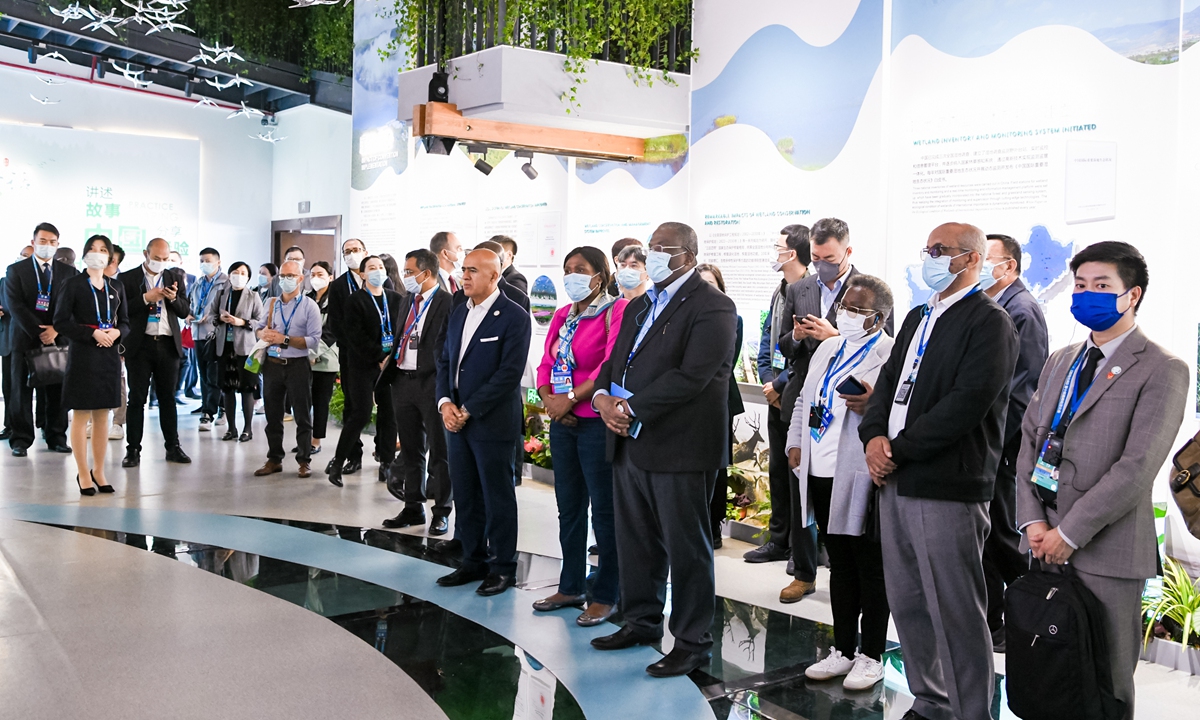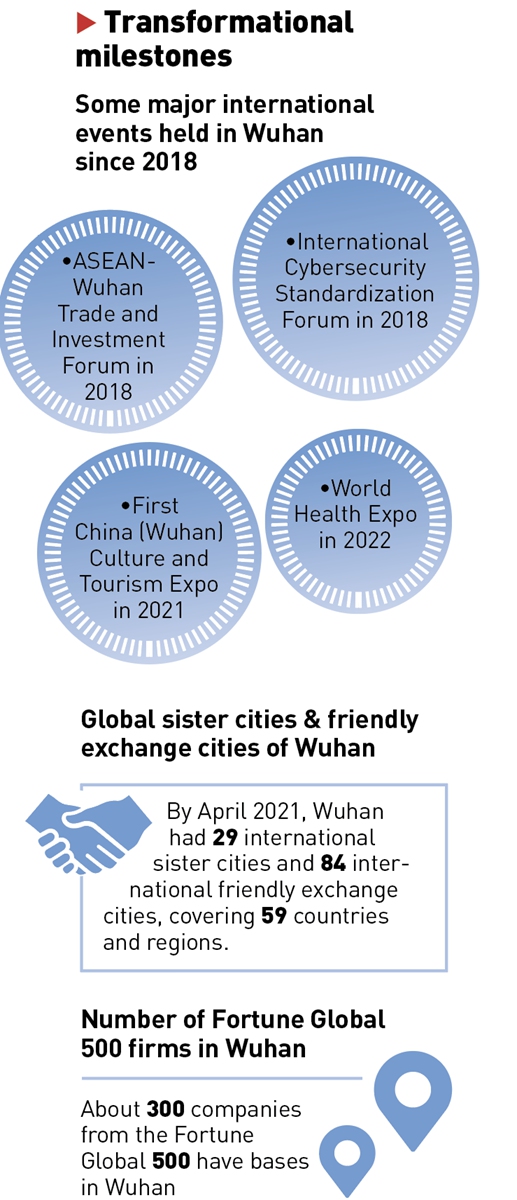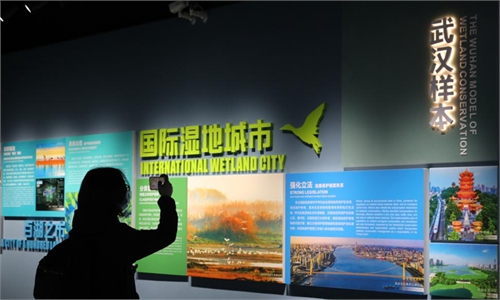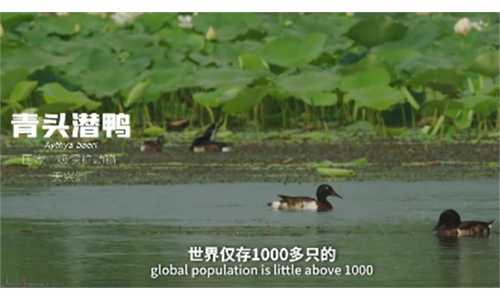IN-DEPTH / IN-DEPTH
Wuhan's hosting of international events shows city is embarking on journey to become more open, inclusive

Foreign guests view an exhibition of China's wetland conservation achievements during the 14th Meeting of the Conference of the Contracting Parties to the Ramsar Convention on Wetland (COP14) held in Wuhan on November 7, 2022. Photo: Hu Yuwei/GT
The railway station bustling with ebullient volunteers welcoming international delegates, the grand opening ceremony for an international event, and the conference flag fluttering on the main road - this is how Central China's Wuhan greeted the participants of the COP14, or 14th Meeting of the Conference of the Contracting Parties to the Ramsar Convention on Wetlands, after more than three years of the COVID-19 pandemic.Wuhan, one of the hardest hit cities by the virus, sent a signal to the world that the painful memory of struggling against the COVID-19 has not stopped it from further opening up. On the contrary, Wuhan is extending its international influence and competitiveness with an open mind and a resilient economy as evidenced by the approximately 300 companies from the Fortune Global 500 that have bases in the city and a series of major international events held there.
With prominent green ecological resources, a vital geographical location, profoundly rich historical and cultural sources, open and efficient policies, and a highly advanced infrastructure, Wuhan has become a major host destination for large-scale foreign affair activities on the heels of megacities such as Beijing, Shanghai, and Shenzhen.
Wuhan is one of China's earliest industrial and commercial cities to have opened to the outside world. Now, as an important hub connecting Yangtze River Economic Belt to the world, Wuhan keeps on optimizing its business environment and is embarked upon a unique way of opening up and developing its economy.
Observers said that Wuhan is embarking on a new journey in becoming a more open and inclusive global metropolis in all respective ways. A magnificent picture of a heroic city in the new era is gradually unfolding.
Elaborate preparations for international events
The COP14, held from November 5 to 13, attracting over 1,000 delegates from contracting parties and international organizations, is a major diplomatic event for China this year, and also the first international conference held in Wuhan after the recently concluded 20th National Congress of the Communist Party of China.
The Global Times has learned from the COP14's organizing committee that the local government made elaborate preparations for the conference. For example, a comprehensive online guidance system in Chinese, English, French, and Spanish for the conference were set up to provide detailed instruction for global delegates. Also, smart technologies were adopted to ensure a real-time connection and live broadcast between Wuhan and Geneva, a parallel conference center.
The Global Times reporter saw that wetland themed slogans, posters, and videos were on display on several key streets in Wuhan, and both sides of the Yangtze River are flashing with themed light shows.
Wuhan residents were also actively participating in the event's volunteer team, with 300 Wuhan college students coming out in support.
Some guests at COP14 told the Global Times how they were impressed by Wuhan's increasingly high level of internationalization and its growing ability to host global events.
UAE Ambassador to China Ali Obaid AI Dhaheri told the Global Times that it is not easy for Wuhan to host such a great event amid the global COVID-19 pandemic, and he felt excited to see the city recovered and join a global mission to protect the wetland.
Lu Lunyan, chief representative of World Wide Fund for Nature Beijing Office (WWF China), underscored the international vision of Wuhan, emphasizing that local citizens and organizations have actively invested in and supported the global mission of wetland conservation.
Local residents have raised awareness of sustainable development thanks to such kind of large-scale conferences on environmental protection held in Wuhan, Lu told the Global Times.

Photo: Global Times
City with opening arms
From the economy to culture, from tourism to ecology, Wuhan keeps extending its international influence via international conferences and events.
To name a few, Wuhan attracted more investors at the ASEAN-Wuhan Trade and Investment Forum in 2018. It inched closer to a first-class information security industry hub at International Cybersecurity Standardization Forum in 2018. It secured potential cooperation in tourism at the First China (Wuhan) Culture and Tourism Expo in 2021, and it explored smart medical solutions at the World Health Expo in 2022.
Wuhan has also gradually become a frontier city in China's diplomacy and foreign contacts, as since 2017, at least four heads of states - former French prime minister Bernard Cazeneuve, former British prime minister Theresa May, Indian Prime Minister Narendra Modi, and former German Chancellor Angela Merkel - have visited Wuhan.
In April 2018, during his official visit to China, Modi visited Wuhan's flagship East Lake National Wetland Park, which has been an attraction for visiting international dignitaries to China.
As early as the 1960s and 1970s, the East Lake National Wetland Park was regarded as one of China's many diplomatic hubs as Chairman Mao Zedong had received guests from dozens of countries during his stay along the East Lake, according to a documentary aired on the China Central Television.
By April 2021, Wuhan had 29 international sister cities and 84 international friendly exchange cities, covering 59 countries and regions. Following this path, local government has vowed to basically build a modern, international, and ecological Wuhan into a national central city by 2035.
A charming window
From ancient times, Wuhan has long been called the thoroughfare to the nine provinces, the flyover of China, and the largest inland land hub, water and air transportation in China. It is also the center of national high-speed rail network and a shipping center in the middle reaches of the Yangtze River.
These days, it connects the world through the extra asterisk-shaped high-speed railway network, the dual hub for the international passenger aviation and freight transport, the direct river and sea route, and the China-EU Railway Express, enabling the circle of Wuhan's friends and partners to widen and continue to expand.
An expanded circle cannot be formed without the support of incredible resources. Wuhan has been home to many universities, research institutes, and well-known design institutes. Statistics show that as of 2018, Wuhan has 89 universities (second only to Beijing's 91), 95 research institutes, and 1.3 million college students, making it the city with the largest number of college students in the world.
National and global scientific and technological exchange activities held in Wuhan attract a large number of foreign scientific and technological experts.
Wuhan has become more inclusive and open in recent years, creating an expat-friendly environment, said Antonina Startseva, who has lived in Wuhan for six years with her husband, a senior engineer at the Lenovo Corporation.
She said that more of her expat friends chose to move from first-tier cities such as Beijing to Wuhan in recent years for a better life-work balance. "As an expat, I know I am from a 'hero city' which was once hit by the COVID-19, but now more people on the outside have started to understand how Wuhan has stepped into a new era to go global," she told the Global Times.
For the purposes of providing more considerate service, Wuhan government has set up a multilingual website for expatriates with guidance on travel, investment, work, study, and life.
Hu Sheng, a 75-year-old Wuhan resident, has volunteered for multiple international events held in Wuhan, including the COP14, and won the title of "most beautiful volunteer" in Hubei Province in 2020.
"Wuhan has about 250,000 volunteers like me participating in various services during global events. In addition to its manpower advantage, Wuhan is innovative with big data, and intelligent management to provide smart services for large-scale events. It is safe to say that Wuhan's ability to host grand events has reached international standards," Hu said.
"The COVID-19 epidemic has made Wuhan famous around the world, and more foreign journalists here wonder what Wuhan looks like today. Wuhan is called a hero city. Now, it has been reborn and welcomes friends from all over the world to travel, invest, and start businesses here with open arms for win-win cooperation," Hu told the Global Times.
Observers say that being an international exchange center will allow the global public to share what Wuhan really looks like amid its return to normalcy and economic vitality.
"Wuhan has a foundation of being an international metropolis considering its friendly investment environment, rich historical culture, indomitability of the citizens, and their open mind," Zhang Yiwu, a Chinese language and literature professor at Peking University who has visited Wuhan many times, told the Global Times.
Zhang suggested that in the future, to accelerate the pace of opening up, Wuhan needs to continuously improve its business environment, attract world-class talent, and gather emerging industries, to promote Wuhan as a driver for China's external communication.



